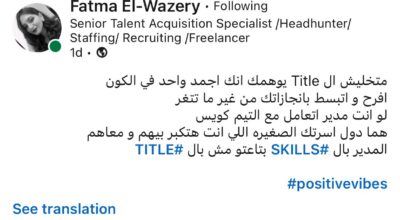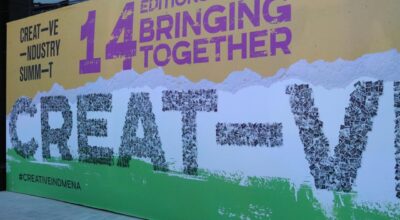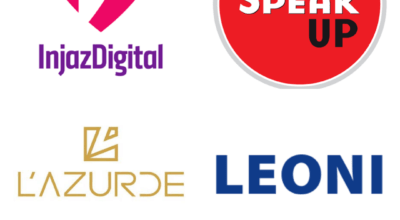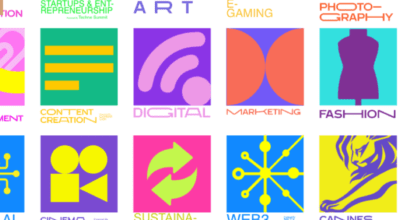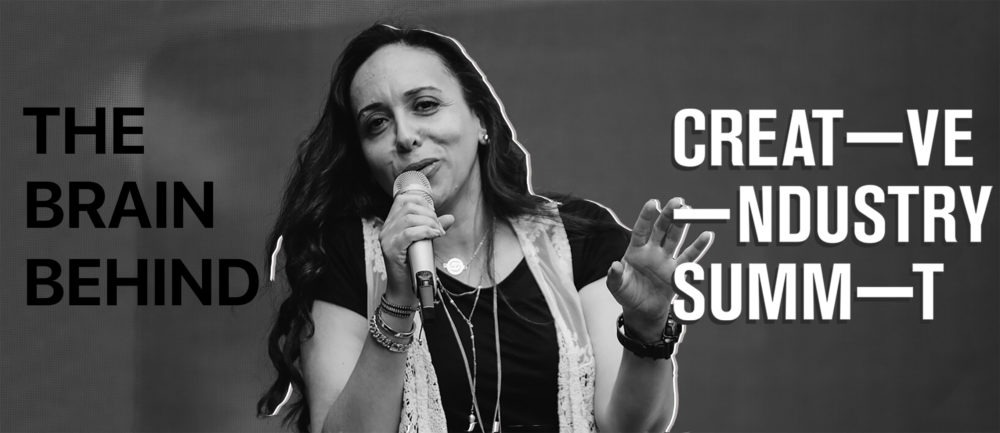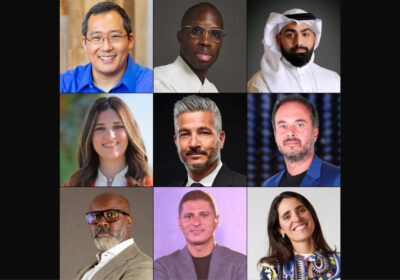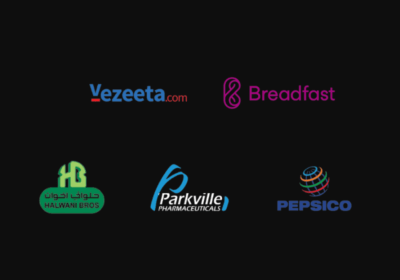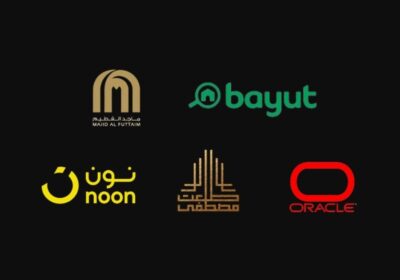Following the Creative Industry Summit, it is important to highlight one of the key reasons for the success of such an event. Much of the credit goes to the coordination efforts of the co-founder of the summit, Mai Salama.
Under her leadership, the Creative Industry Summit has been thriving and shedding light on new talents since 2014; expanding businesses and connecting dots from one end of the creative spectrum with another. Having had significant experience in the creative field, she is the best person to lead such a platform effortlessly.
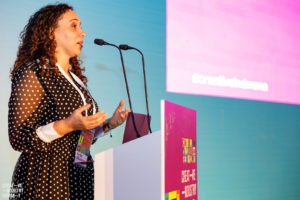
The Real Brain Behind the Summit
Talking about a successful summit is one thing. But 925 leans more towards digging deep into the story behind everything — especially if it’s work-related. Therefore, we opened a heart-to-heart conversation with Mai Salama; unlocking her aspirations, mindset, and points of view from the perspective of a lost fresh graduate who’s craving ways to excel at his/her job.
The Curve of The Creative Industry in The Eyes of Mai Salama:
It’s very important to define the scope of the summit first. Mai incorporates not only the creative crafts such as advertising or filmmaking but the creative economy in general. She believes that creativity is not just exclusive to the known creative industries.
“Look at the new credit card companies. Look at the music scene. That is a real innovation. Creativity is everywhere.” She highlighted. Mai went as far as to state that creativity is embedded within Egyptian DNA. Most notably, Egyptians like to make creative jokes. “We always like to make fun of ourselves before someone makes fun of us.” She mentioned.
Moving back to the curve of creativity, Mai believes that it is on the rise and also spreading across different businesses. And that is bound to happen as the Egyptian people are creative by nature. “Look at Egyptian programmers and developers, companies from around the world come to hire them. Look at Egyptian pilots. They’re the best in the world and work in various airlines.” Salama added.
The true core belief that moves her towards making the summit impactful is that Egypt is sitting on a goldmine of creativity. People use it in their daily lives but they don’t yet utilize it in the best way at their work.
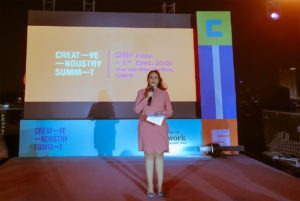
The Intended Impact of the Creative Industry Summit on the Creative Scene in Egypt
The main objectives of the summit are mainly to shed light on new talents, activate them, and connect them together to form a bigger and stronger network. That – in of itself – is a small tool to realize this network.
The summit tries to encourage people and let them know that they, too, can be one of the influential creative people in the industry.
“We usually hear this: I saw something this year in the summit. And it made me want to try something. This gave me a push and I did it and I’m happy.” She cited one of the attendees.
The second thing to achieve through C—S is to enlighten and educate people through a broad spectrum of workshops; spanning from event lighting to e-commerce. She still highlighted the fact that the summit includes many different tracks.
Mai Salama on Banning Certain Types of Music in the Scene:
“I’m not pro or against the type of art that has been suffering from the banning these days. For example, when we brought Mohamed Ramadan a few years ago, I wasn’t, and still, not a fan. But in fact, I respect what he did. I don’t watch his content nor do I listen to his music. Yet, he is someone who came to light from the void, had an objective, worked hard on it, made a brand out of himself. Now, he is — I know it’s a cliché – Number One.”
When I contacted him, I clearly stated that I was bringing him as a brand, not as a fan. Believe it or not, he liked the idea and my objectives and that’s why he came.” She explained.
Mai believes there will always be a genre of music on which some people will approve of and some will not. It is also important to have regulations and rules governing the scene. Yet, freedom, in general, is crucial. There should be a better way to deal with different tastes other than banning them. “Everything has to be out there. and you are free to criticize whatever you want” she said.
The Coming Additional Tracks in the Next C—S:
According to Mai, the expectation is to expand existing tracks in this year’s summit. She aspires to dig deeper into sustainability, female empowerment, and mental wellness.
“It always hurts to dig into a track for the first time, find different topics to feed through panels, and then to have to cancel some of them due to the time constraints” she commented.
On the Statement: “Creative People Need Special Treatment”
“Everyone needs special treatment, not just artists. Humans, by default, are different and therefore require a different style of treatment. Even here in my team, you’ll find someone whom I’m very tough on because I know she can handle it. While, on the other hand, I treat someone with utmost gentleness because she will not be able to handle cruelty” Mai commented.
“Indeed, knowing how to handle people is a very important skill. And by special treatment, it doesn’t necessarily mean to be gentle. In fact, it means to be more nimble and flexible with your style of treatment according to the person you’re dealing with” She added.
The Point of Balance Between Creative Freedom and Client Needs
Immediately, Mai referred to the lack of education…There is a tendency in people to create things according to their personal preferences; when the right thing to do is to look for the preferences of the consumer. Clients and creatives do have that frustrating “back and forth” movement because of mainly two things:
- Most of the time, there is no reference to the consumer’s taste or preferences on which the creative may build his/her work while the client can use it to measure the quality of the service or product.
- The mindset of collaboration and partnership transforms clashes into debates. If the Creative and the Client work together as a team, they will produce something that perfectly suits the consumer.
The education part also plays a role in when to interfere and when to not. A marketeer can step in when he/she realizes there is a huge deviation from the goal. He/she also can interfere when there is no need for intervention.
Frankly, there has to be a mindset of collaboration while, at the same time, a clear idea of the professional boundaries of each job title.
Mai Salama’s Advice to Fresh Graduates:
“Whenever I sit with my friend’s kids, I tell them to look inside themselves and see what they like, even upon entering university education. This is because the job which you end up enjoying is that one hobby that you love doing. If you like to talk a lot, then you’re about people. If drawing is your thing, you need to be some kind of an artist. However, it’s not just about the “like.” It’s also about passion.
For example, my hobby when I was a kid was to record video commercials on VHS tapes. One day during my time in advertising, as I was passing by a media monitoring room, I saw a series of old commercials playing on one of the screens. That’s when I remembered: I used to record those commercials and show them to my cousins in the United States to prove that Egyptian commercials are fun while US commercials are ugly.
I ended up working in the field that I love and I enjoyed every day of it. I grew up in my field because I loved it, even though it was a hectic job. Even when I started doing summits and conferences, I ended up with something that brushes shoulders with advertising. So, I am happy I’m still doing that.”
What If What I like Doesn’t Support Me Financially?
“You will have to work for your bread and butter, unfortunately. But If you create the right content, you will flourish eventually…here…out there…somewhere…it will flourish.
Don’t get me wrong, you hit rock bottom and experience the toughest time of your life. But that never goes to waste. I am super convinced of that. At some point, you will bounce back up. Rock bottom is harsh and you usually think to yourself: “There’s nothing worse.” Yet, you get surprised that there is more bottom than what you’re in. Don’t let that get to you and eventually, you’ll go back to the top.
You Learn and Then Pass the Torch
Having such a heart-to-heart conversation with Mai Salama truly shows her passion for what she does. Only the passionate have the will to spread the knowledge and show the beauty of their world. Only the passionate persevere long enough to shine and levitate above mediocrity.
Were you able to attend the Creative Summitt this year? Share your experience in the comments section!

